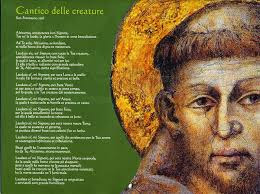As
I'm writing this just before Easter, I often think about Saint
Francis, who I have spent the last few months studying. Recently, I
went to Assisi to explore the town where he was born in 1182, 701
years before Adele Costa Gnocchi, but only 20 miles away.
He was a
nature lover, living often under the open sky, and he was friends
with all animals. He wrote a song-poem Laudato Si' shortly before he
died where he expressed the universality of nature, the oneness that
we are all a part of.
"Be praised, my Lord, through all Your creatures,
especially through my lord Brother Sun,
who brings the day; and You give light through him.
And he is beautiful and radiant in all his splendor!
Of You, Most High, he bears the likeness."
Laudato
si' is also the name of the second encyclical of Pope Francis, the
first pope to take his name. The encyclical has the
subtitle "on the care for our common home". In it, the pope
critiques consumerism and irresponsible development and laments
environmental degradation, and calls all people of the world to take
"swift and unified global action."
Maria
Montessori sang a similar song: she said that it is our “cosmic
task”, the protection of the biosphere. And Grazia Honegger Fresco
says that this “cosmic task” has its origins in the very
beginning of life through the expression of what she defines as “the
alphabet of human work”, universal characteristics of development
that are completely observable. Respecting each person's drive to
explore in his or her own way from the earliest days of life creates
a culture of respect that is incarnated.
From
the Cosmic Task 0-3 Films shown in Prague:
“Maria
Montessori thought that humans, like all species, have a task to
fulfill, she called it "cosmic" - in harmony with
the cosmos - that leads us to the awareness of the responsibility for
the biosphere and the protection of all living species.
The sensitivity to such a task is not acquired all of a sudden in the adult phase, rather it is constructed step by step by the child, beginning at birth. But only if we respect him and foster all of his potential.
It is our task, I believe, as early childhood educators, to protect to the greatest extent possible, the originality of each child in the first years of life, allowing him to experiment in his own way with the objects he is attracted to. This is the first step on the path of peace that Maria Montessori envisioned: an education as an aid to life, for all of humanity.” GHF



Comments
Post a Comment